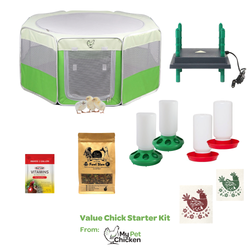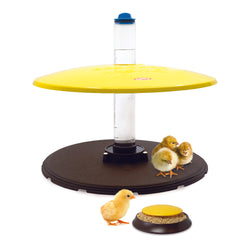All about Marek's Disease
Back to blog
Marek's disease is a dreaded illness that can be contracted by chickens nearly anywhere in the world. It is almost always fatal, and even birds that survive will be continue to be carriers their entire life. Most healthy birds are capable of fighting off the virus so symptoms do not develop, but in times of stress the virus may overwhelm their defenses and they may become symptomatic. We offer a vaccination for Marek's disease, which can greatly reduce mortality in a flock if the disease is contracted. Read on to find out more.
Marek's Disease Also called
Neurolymphomatosis, MD, range paralysis, grey eye, Marek's, uveitis, neutitis, pseudobotulism, false botulism, cancer
Prevalence
Very common
Signs
General signs -
In chicks, weight loss despite good diet, followed by deaths starting at around 8 weeks old. In older birds, scabby tumors on skin, clumsiness, leg paralysis, cloudy eyes w/frozen irises, rapid weight loss, followed by death. There are four main forms the Marek's can take: ocular (in the eye), neural (causing paralysis), cutaneous (tumors forming on skin), and visceral (tumors forming on internal organs)
Cardinal or diagnostic signs -
Cancers can be diagnosed in the laboratory.
Cause/s
Viral. Marek's disease virus (MDV) or Gallid herpesvirus 2.
Communicability
Yes. It is very contagious and can be passed from bird-to-bird through feather dander and in used litter. It is inhaled in fine particles. It survives for many months in dust. Some strains are especially virulent and can overcome vaccination.
Communicability to humans
No.
Incubation period
14 days, but outward visual signs may take longer to become apparent
Latent
Yes. Chickens who survive are carriers. However, most chickens probably have been exposed to Marek's disease, but in most, their immune systems can successfully fight it off. If they become stressed their immune response may be insufficient to fight it off, and they can become sick.
Endemic
Yes. Marek's is ubiquitous all over the world.
Home treatment and/or prevention
Prevention: Vaccination. In vaccinated flocks exposed to Marek's, only about 10% will contract the disease if exposed (primarily to virulent strains). Vaccination also reduces the amount of virus shed in dander. We recommend you have your chicks vaccinated for Marek's disease. For best effect, make sure newly vaccinated birds are kept away from possible exposure to Marek's (in an enclosed brooder, for example) for one or two weeks until their immunity fully develops.
Treatment: Almost all chickens that contract Marek's will die. If you wish to try to nurse a bird, though, your job will primarily be to make sure the chicken continues to eat and drink. That said, consider carefully that you are not simply prolonging suffering. This is a difficult, personal choice, and we empathize with anyone having to face that decision.
Veterinary care
There is no treatment for this virus.
Recovery
Unlikely, but we have read reports of sporadic recovery.
Other conditions, illnesses and/or diseases with similar signs:
Lymphois leucosis, botulism, star gazing, Newcastle, others.
Also consider browsing through this list of other chicken illnesses with neurological symptoms.
Marek's Disease Also called
Neurolymphomatosis, MD, range paralysis, grey eye, Marek's, uveitis, neutitis, pseudobotulism, false botulism, cancer
Prevalence
Very common
Signs
General signs -
In chicks, weight loss despite good diet, followed by deaths starting at around 8 weeks old. In older birds, scabby tumors on skin, clumsiness, leg paralysis, cloudy eyes w/frozen irises, rapid weight loss, followed by death. There are four main forms the Marek's can take: ocular (in the eye), neural (causing paralysis), cutaneous (tumors forming on skin), and visceral (tumors forming on internal organs)
Cardinal or diagnostic signs -
Cancers can be diagnosed in the laboratory.
Cause/s
Viral. Marek's disease virus (MDV) or Gallid herpesvirus 2.
Communicability
Yes. It is very contagious and can be passed from bird-to-bird through feather dander and in used litter. It is inhaled in fine particles. It survives for many months in dust. Some strains are especially virulent and can overcome vaccination.
Communicability to humans
No.
Incubation period
14 days, but outward visual signs may take longer to become apparent
Latent
Yes. Chickens who survive are carriers. However, most chickens probably have been exposed to Marek's disease, but in most, their immune systems can successfully fight it off. If they become stressed their immune response may be insufficient to fight it off, and they can become sick.
Endemic
Yes. Marek's is ubiquitous all over the world.
Home treatment and/or prevention
Prevention: Vaccination. In vaccinated flocks exposed to Marek's, only about 10% will contract the disease if exposed (primarily to virulent strains). Vaccination also reduces the amount of virus shed in dander. We recommend you have your chicks vaccinated for Marek's disease. For best effect, make sure newly vaccinated birds are kept away from possible exposure to Marek's (in an enclosed brooder, for example) for one or two weeks until their immunity fully develops.
Treatment: Almost all chickens that contract Marek's will die. If you wish to try to nurse a bird, though, your job will primarily be to make sure the chicken continues to eat and drink. That said, consider carefully that you are not simply prolonging suffering. This is a difficult, personal choice, and we empathize with anyone having to face that decision.
Veterinary care
There is no treatment for this virus.
Recovery
Unlikely, but we have read reports of sporadic recovery.
Other conditions, illnesses and/or diseases with similar signs:
Lymphois leucosis, botulism, star gazing, Newcastle, others.
Also consider browsing through this list of other chicken illnesses with neurological symptoms.



